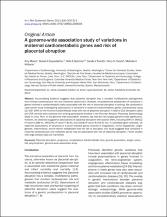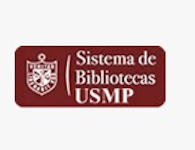A genome-wide association study of variations in maternal cardiometabolic genes and risk of placental abruption

View/Open
Trabajo
(application/pdf: 439.6Kb)
(application/pdf: 439.6Kb)
Date
2012-11-05Author(s)
Moore, Amy
Enquobahrie, Daniel A.
Sanchez, Sixto E.
Ananth, Cande V.
Pacora, Percy N.
Williams, Michelle A.
Metadata
Show full item recordAbstract
Accumulating evidence suggests that placental abruption has a complex multifactorial pathogenesis that involves cardiovascular risk and metabolic dysfunction. However, comprehensive assessment of variations in genes involved in cardiometabolic traits associated with the risk of placental abruption is lacking. We conducted a case-control study investigating associations of variations in maternal cardiometabolic genes (characterized using 217,697 SNPs on the Illumina Cardio-Metabo Chip) with risk of placental abruption. A total of 253 abruption cases and 258 controls were selected from among participants enrolled in the Peruvian Abruptio Placentae Epidemiology Study in Lima, Peru. In the genome-wide association analyses, top hits did not surpass genome-wide significance. However, we observed suggestive associations of placental abruption with several SNPs, including SNPs in SMAD2 (P-value=1.88e-6), MIR17HG (P-value=7.8e-6], and DGKB (P-value=8.35e-6] loci. In candidate gene analyses, we observed associations of variations in a priori selected genes involved in coagulation, rennin-angiotensin, angiogenesis, inflammation, and B-vitamin metabolism with the risk of abruption. Our study suggests that variations in maternal cardiovascular and metabolic genes may be associated with risk of placental abruption. Future studies with large sample sizes are warranted.
Collections
- Artículos [274]
Subject
Publisher
e-Century Publishing
Rights
info:eu-repo/semantics/openAccess
Funding
National Institute of Health, the Eunice Kennedy Shriver National Institute of Child Health and
Human Development (5 R01-HD059827; T32HD052462) and the National Heart Lung
and Blood Institute (K01HL10374).







